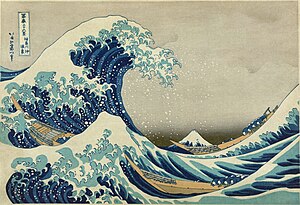A documentary by BBC4 explores views of risk in terms of cultural clues and imagery. It interviews numerous experts to reveal the origins of The Great Wave off Kanagawa print, and shows how it has represented very different things to different people.
The Japanese viewer apparently sees groups of men set together in harmony with nature to achieve success — possibly a spring-time catch of bonito fish for a hard-working crew returning as quickly as possible to a market. The huge, towering wave is not an image of despair but of power and collective effort. Toshio Watanabe, a Japenese Art Historian, explains:
(1:14/10:04) “It’s depicting, basically, speedboats like DHL or FedEx.” […] (9:14/10:04) This is an image of courage and perseverance because the oarsmen have a job to do. “There are so many rowers because they need speed and they are not worried about the waves at all. They are taking it in great stride.”
Dr. David Peat, a Physicist at the Pari Center in Italy (among several others) suggests a very different effect for a viewer from the West. He sees the Great Wave as a moral lesson for an individual, which centers around mortality, anxiety and a fear of the unknown (based on chaos theory):
(5:40/8:25) It’s telling us something about being on the edge of chaos; something about how we live our lives. We have to have regularity and order. But if we have too much then we become dead. So it’s telling us where life lies. It’s telling us something about ourselves. We have to learn how to live on the edge of chaos.
Although it is easy to split the views and categorize them among Far East and Western views, following the BBC’s narrative, it could be split a different way. Those who live in and around water and on small boats may look at the Great Wave as familiar and controllable; while those who spend all their time on land may look at the wave with fear of the unknown — “surf’s up” versus “run”. Which are you?
